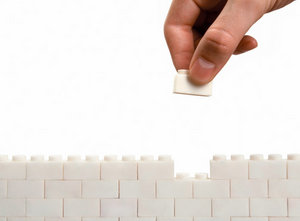To Your Health
July, 2008 (Vol. 02, Issue 07) |
|
|
Protein: One of the Body's Key Building Blocks
By Dr. Donald Hayes
Protein is an important building block, comprising about 16 percent of our total body weight. Muscle, hair, skin and connective tissue consist primarily of protein, and protein plays a major role in all of the cells and most of the fluids in our bodies.
Enzymes, hormones, neurotransmitters and even our DNA are at least partially made up of protein.
Although our bodies are good at "recycling" protein, we constantly use it up, so we need to replenish it. Protein is composed of smaller units called amino acids. Our bodies can't manufacture nine amino acids, so it's important to include them in our diets. Animal proteins such as meat, eggs and dairy products contain all the amino acids. By combining vegetable-source proteins such as rice, beans, peas and others, a complete vegan/vegetarian option is available as well.
How Much Protein Do We Need?
Our protein requirements depend on our age, size and activity level. The typical American diet provides plenty of protein - more than the recommended daily allowance (RDA) in most instances. The RDA represents the minimum amount of protein needed to fulfill protein needs in 97.5 percent of the population. This value is equal to 0.8 g of protein per kilogram of body weight per day. Accordingly, a person weighing 150 lbs. should eat 55 grams of protein per day, a 200-pound person should eat 74 grams, a 250-pound person should eat 92 grams, and so on.
 The average mixed American diet provides from one to two times the RDA for protein. You might think, based on this, that protein deficiency is unlikely in the U.S. However, the RDA for protein has been derived from research studies performed on healthy individuals. Growing children, pregnant and lactating women, the elderly, and anyone undergoing severe stress (trauma, hospitalization or surgery), disease or disability need more protein.
The average mixed American diet provides from one to two times the RDA for protein. You might think, based on this, that protein deficiency is unlikely in the U.S. However, the RDA for protein has been derived from research studies performed on healthy individuals. Growing children, pregnant and lactating women, the elderly, and anyone undergoing severe stress (trauma, hospitalization or surgery), disease or disability need more protein.
Protein Powders and Meal Replacement Shakes
As supplement companies improve the quality of their protein powders and more people seek convenience while trying to eat right, the thought of meal replacements making up a portion of the protein in your diet makes sense.

